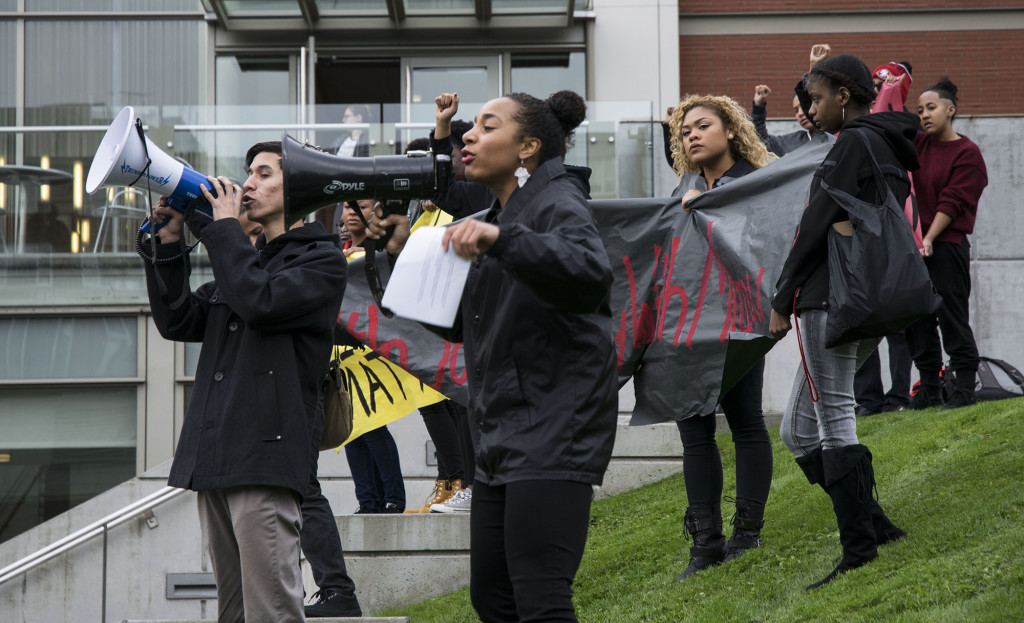The gathering of people in front of the Lemieux Library in teeth-chattering cold last Thursday painted an unmistakable image—one of hope, power, anger and determination to end systemic racism at institutions across the nation.
Last Monday, a University of Missouri student called for a National Day of Action in solidarity with their student-led movement against ongoing systemic marginalization of students of color, specifically black students. Seattle University was one of many campuses nationwide that answered this call.
“Back up, back up! We want freedom, freedom! All these racist ass schools we don’t need ‘em, need ‘em!” they chanted, their echoes piercing the air.
The acts of racism at Mizzou that led to protests—including threats made on Yik Yak, student protest at a school parade and racial slurs that administration failed to address—are not isolated. They are a part of much larger societal injustices that students and faculty at Seattle U experience pain from as well.
Seattle U was founded on the ideas of white supremacy, the after effects of which can be easily seen in the school’s perpetuation of institutional racism, according to senior political science and Spanish major Olivia Smith, who helped lead the rally. She encounters microaggressions and the silencing of her voice on campus regularly.
“From comments you get asked speaking in class, the way they look at you, ask you to speak—to tone it down or be softer or not be as aggressive—whatever that means,” Smith said.
Senior psychology major Rickey Leachman, who held up one of the banners at the rally, has experienced both overt and covert racism. He mentioned an instance when he was walking through campus in the middle of the night and two students ran away from him in fear—only to meet up with him again at the library where Leachman helped swipe them inside the building. It is not only specific actions like this that reveal racism on our campus, but also the exclusion of various groups.
“The things that the campus puts on, the events they do, is definitely geared toward certain groups over other students,” Leachman said.
Student protest, such as with the Black Panther Party, the Chicano Movement and Vietnam War protests have successfully catalyzed change nationwide. Many students at Seattle U—such as sophomore Nicolás Cruz, who also helped lead the rally—recognize this.
“The protests going on right now in Mizzou and also Yale, Claremont schools is continuing the legacy of student protest,” Cruz said.
As students, we hold immense power to make change. Leachman said now is the most opportune time in our lives to protest because students have the ability to draw national attention. Cruz agreed with this point noting how being a student puts us in a place of privilege.
“I think it’s kind of a balance of seeing our ability or seeing our strength, but also acknowledging the privileges we have at Seattle U,” Cruz said.
At the rally, President Fr. Stephen Sundborg, S.J. said he was most pleased by the leadership of the students in organizing this rally, and that Mizzou has challenged us to look at ourselves and find out what’s really happening at Seattle U in regards to racism, gender and how we treat one another.
“I’ve got bias and racism in myself and I’ve got to deal with that,” Sundborg said.
Those that paved the way for change at Mizzou were primarily black queer women, which Smith sees as very important to the Black Lives Matter movement.
“The very existence of queer women of color challenges the foundation of white supremacy,” Smith said. “It is important that…black queer women are center stage and are leading the movement.”
Students and staff continued to show solidarity with Mizzou last Friday, wearing all black at the men’s and women’s basketball games. But community efforts to end racism at Seattle U and Qtheir role in the Black Lives Matter movement are nowhere near over.
Student Government at Seattle University has taken the initiative to start conversations about our identities, intersectionality and diversity on our campus. They have asked marginalized identities on campus to write about their experiences in letters to Seattle U. These letters will be presented by the end of the week.
At-Large Representative Jonathan Fikru wrote one of the letters.
“Dear SU…I was told I couldn’t play the part of a ‘white character’ in a skit because, some people saw it as ‘bad taste’…refusing to let me have agency in the decisions I made,’” said Fikru in the letter.
Fikru, Cruz and Leachman have organized a protest workshop for Nov. 22 at 11 a.m.–1 p.m. in Chardin Room 142 in direct preparation for #BlackLivesMatterFriday2.0 on Nov. 27. The workshop will prepare students with first aid, legal, and police tactics information. Leachman said that it is crucial for students to show up and show support for these kinds of actions as they are critical to social justice.
“If you’re not actively a part of the solution you’re a part of the problem,” Leachman said. “Being complacent and letting it happen makes you just as guilty as the powers that be.”
Melissa may be reached at editor@su-spectator.com








